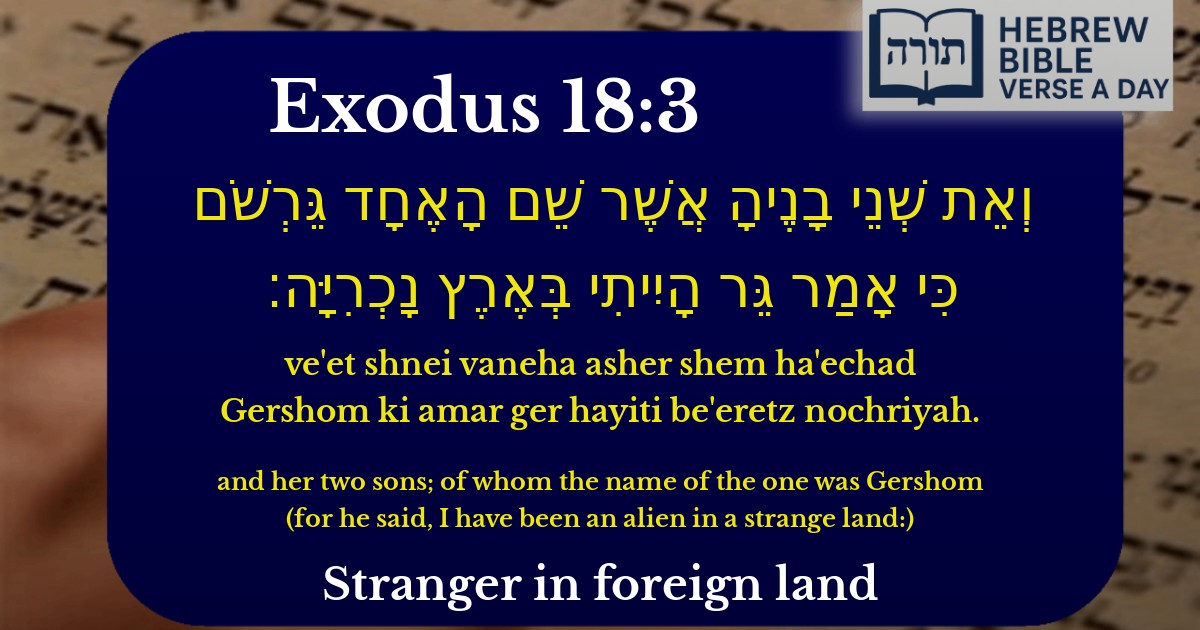Join Our Newsletter To Be Informed When New Videos Are Posted
Join the thousands of fellow Studends who rely on our videos to learn how to read the bible in Hebrew for free!
Hebrew Text
וְאֵת שְׁנֵי בָנֶיהָ אֲשֶׁר שֵׁם הָאֶחָד גֵּרְשֹׁם כִּי אָמַר גֵּר הָיִיתִי בְּאֶרֶץ נָכְרִיָּה׃
English Translation
and her two sons; of whom the name of the one was Gershom (for he said, I have been an alien in a strange land:)
Transliteration
Ve'et shnei vaneha asher shem ha'echad Gershom ki amar ger hayiti be'eretz nochriyah.
Hebrew Leining Text
וְאֵ֖ת שְׁנֵ֣י בָנֶ֑יהָ אֲשֶׁ֨ר שֵׁ֤ם הָֽאֶחָד֙ גֵּֽרְשֹׁ֔ם כִּ֣י אָמַ֔ר גֵּ֣ר הָיִ֔יתִי בְּאֶ֖רֶץ נׇכְרִיָּֽה׃
וְאֵ֖ת שְׁנֵ֣י בָנֶ֑יהָ אֲשֶׁ֨ר שֵׁ֤ם הָֽאֶחָד֙ גֵּֽרְשֹׁ֔ם כִּ֣י אָמַ֔ר גֵּ֣ר הָיִ֔יתִי בְּאֶ֖רֶץ נׇכְרִיָּֽה׃
🎵 Listen to leining
Parasha Commentary
📚 Talmud Citations
This verse is quoted in the Talmud.
📖 Sotah 12a
The verse is referenced in the context of discussing the naming of Gershom, explaining the significance of his name as reflecting Moses' experience in a foreign land.
📖 Megillah 13a
The verse is mentioned in relation to the story of Moses and his family, emphasizing the theme of exile and foreignness.


Explanation of the Verse
The verse states: "וְאֵת שְׁנֵי בָנֶיהָ אֲשֶׁר שֵׁם הָאֶחָד גֵּרְשֹׁם כִּי אָמַר גֵּר הָיִיתִי בְּאֶרֶץ נָכְרִיָּה" ("and her two sons; of whom the name of the one was Gershom, for he said, I have been an alien in a strange land"). This refers to Moshe Rabbeinu naming his firstborn son Gershom while he was in Midian.
Rashi's Commentary
Rashi (Shemot 2:22) explains that Moshe named his son Gershom to commemorate his status as a stranger in a foreign land. The name גֵּרְשֹׁם (Gershom) is derived from the root גֵּר (ger), meaning "stranger" or "sojourner," and שָׁם (sham), meaning "there." Thus, the name signifies, "I was a stranger there." Rashi emphasizes that Moshe acknowledged his temporary status in Midian, recognizing that his true home was among Bnei Yisrael.
Ibn Ezra's Insight
Ibn Ezra (Shemot 2:22) adds that Moshe's choice of name reflects his humility and awareness of his circumstances. Despite being raised in Pharaoh's palace, Moshe did not forget his origins as a Hebrew, and his time in Midian reinforced his identity as a stranger in exile.
Midrashic Interpretation
The Midrash (Shemot Rabbah 1:32) elaborates that Moshe's naming of Gershom was prophetic. It foreshadowed the future exile and redemption of the Jewish people, as they too would be strangers in foreign lands before returning to Eretz Yisrael. The name serves as a reminder of the Jewish people's historical experiences of displacement and divine salvation.
Halachic Perspective
Rambam (Hilchos Melachim 5:10-11) discusses the importance of remembering one's status as a stranger, as this fosters empathy and righteousness. Moshe's naming of Gershom exemplifies this principle, teaching that even great leaders must remain mindful of their humble beginnings and the struggles of others.
Key Lessons